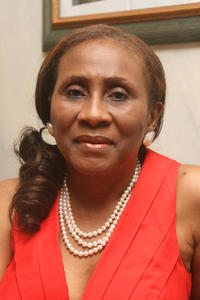The positive momentum that is supporting the sanitation and hygiene campaign in Nigeria owes a great deal to Engr. Ebele Okeke, WSSCC’s “WASH Ambassador” in the country.
Published on: 02/08/2011
The former head of Nigerian civil service and once the Permanent Secretary in Nigeria’s Ministry of Water Resources, Engr. Okeke has been influential in pushing sanitation issues throughout the country since her appointment in September 2010. She is working with the press and the National Task Group on Sanitation (NTGS) to drive high-level advocacy and campaigns towards addressing the significant challenges in sanitation and hygiene.

… through advocacy visits
One of her first advocacy visits was a courtesy call on the Honourable Minister of Water Resources. During her visit, Engr. Okeke discussed bringing sanitation to the forefront by suggesting the establishment of a department within the Ministry to focus on sanitation issues. In a subsequent restructuring, a new Department of Water Quality Control and Sanitation was established within the Ministry of Water Resources to focus on sanitation and water quality. The new department, with its own mandate and budget line, has led the sector in responding to the sanitation challenges of the country. The department is leading the Sanitation and Water Quality sector in actualizing the contents of the National Road Map on Water Resources as it affects the sector.
… through delivering keynote addresses and goodwill messages
The WASH Ambassador brings sanitation and hygiene issues to the forefront by speaking at national events. For example, the second National Roundtable Conference on Community-Led Total Sanitation (CLTS) was held in Calabar, Cross River State, from 5 to 9 October 2010. The Conference focused on the current state of CLTS implementation and provided a platform for CLTS practitioners to share their experiences and advocate to support sanitation development. A goodwill message was delivered on the WASH Ambassador’s behalf during the Conference and placed particular focus on mobilising resources at the state and local government levels to take CLTS to scale.
A few days later, Engr. Okeke marked the 2010 Global Handwashing Day, the annual event designed to raise awareness and foster the practice of hand washing with soap, 15 October with a keynote address in Nigeria. The WASH Ambassador focused on the importance of hand washing at critical moments and called for effective collaboration amongst key stakeholders to address the hand washing challenges in Nigeria. The event marked the first collaboration between the private sector, Unilever, and government and civil society in a hand washing campaign. In the presence of a large number of school children as well as the Permanent Secretary of the Federal Ministry of Water Resources, Executive Directors of Unilever, and other dignitaries, the WASH Ambassador demonstrated the correct manner to wash hands with soap and water. Stemming from the success of the event, Unilever invited Engr. Okeke to chair the opening ceremony of their one day symposium on Hand Washing on 17 May 2011.
Carrying momentum into the new year, the WASH Ambassador—on an invitation from the National Council on Water Resources, the highest decision-making body in the water sanitation sector in Nigeria—attended the first Presidential Summit on Water on 17 January 2011. Speaking at the Summit, Engr. Okeke called for a Presidential Committee on Sanitation to be set up. She emphasised that a high-level committee will have the leverage to push for joint memorandum of understanding across the three tiers of government in Nigeria and to mobilise resources from the three levels of government to fund sanitation interventions. She is following up with relevant contacts at the Presidency for setting up the Committee.
… through the inauguration of a State Task Group on Sanitation
A WSSCC-funded sensitisation workshop held in June 2010 encouraged states to form a State Task Group on Sanitation (STGS). Working towards this, and to bring synergy into WSSCC funded activities in Nigeria, the NTGS prioritised the two states selected for the Global Sanitation Fund (GSF) Programme—Benue and Cross Rivers—as the states to be supported to have functional STGS.
As part of the GSF intervention for the states of Benue and Cross Rivers, two teams were organised to visit each state. The WASH Ambassador led the team on an advocacy and sensitisation visit to Benue from 29 to 30 March 2011, while the Director of Water Quality and Sanitation led the other team to Cross Rivers. In Benue, the WASH Ambassador held discussions with the Honorable Commissioner of the Ministry of Water Resources Benue State and other high-level officers. She informed them of the criteria used for the selection of the State for the GSF with the aim of taking sanitation intervention to scale in Nigeria by achieving 100% open defecation free Local Government Areas in the State. The Commissioner assured her of the State Government’s commitment to the GSF project.
… through hosting political dialogue on sanitation
Leading up to the election, the NTGS monitored campaign promises made by Nigeria’s 60+ registered political parties. Despite the daunting challenges faced by the country in terms of sanitation coverage, an analysis of campaign promises showed that sanitation and hygiene were not prioritised. In response, the WASH Ambassador and the NTGS collaborated to organise a political dialogue with the political parties to inform them of the key sanitation and hygiene issues in the country, and to encourage them to prioritise these issues once in office. The event was held on 17 March 2011 with the active support of WaterAid, NEWSAN, and the WASH Media Network. The NTGS is following up on commitments with the new administration.
“I have been committed to improving sanitation and hygiene practices in Nigeria, and through Africa, for many years now,” said Engr. Ebele Okeke. As a WSSCC Ambassador, I have the chance to step up this work, and be a part of a worldwide group of people who share a similar vision. I believe that providing access to safe, affordable sanitation to all people is possible, and it is our responsibility to make it happen.”